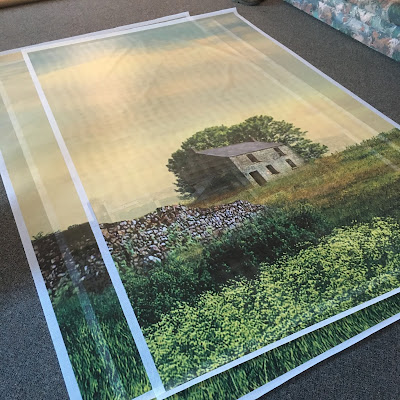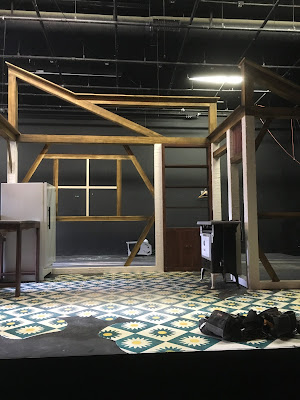A
National Theatre School graduate with an MA in Cross-Cultural Spirituality from
Regis College, John has over 45 years as a working actor—including 12 seasons with the Stratford
Shakespeare Festival. Since first appearing on our stage in 2015's Mass Appeal, he's made appearances on two Hallmark
TV series: When Calls the Heart and Garage Sale Mystery, as well as lending his voice to the animation series Superbook. Bonus? A
recent two-week visit to Ireland. “You gotta love research!”
 |
| John Innes as Tony Reilly in Outside Mullingar. Photo by Dale Marushy. |
Where do you call home?
"Most of my adult life I have been a gypsy, but currently I call Vancouver home."
What's your 'must-have' morning ritual?
"For a number of years now I have been an admirer of the contemporary Franciscan monk, Richard Rhor. He has a meditation on-line which I start my day with, reading and meditating on."
Favourite (theatre) shows you've been a part of?
"When asked what is my favourite role or show, I tend to say, "The one I'm working on." However, two of my most terrifying, but proudest experiences were: Stepping in for Brian Bedford as King Lear on the Stratford Shakespeare Festival stage, & playing Horst in the Canadian premiere of Bent at Manitoba Theatre Centre."
Favorite TV/Film experience? (You were on AirWolf AND 21 Jump Street! Pretty sweet...)
"My proudest moment in TV/Film was when a Hallmark TV movie which I had a major role in Christmas Lodge, won a Dove award (2013) as best family Christmas video of the year."
So you went to Ireland... you method actor, you. What did you learn about the land you'd like to share? Any pleasant surprises?
"What can I say? I made a similar excursion to Ireland two years ago before I did a production of The Seafarer at Pacific Theatre in Vancouver - to soak up the distinctively Irish atmosphere and to become acquainted, first hand, with the various local dialects... I'm not a very good researcher when it comes to book or picture learning. Experience, for better or worse, has generally been my teacher. I needed to feel the land, breathe the air, listen to the local dialects, observe their dress, eat their food, etc... Plus, for me, as a passionate traveller and an actor, any trip that I can call research is tax deductible. I fell in love with the people, especially the country folk, their earthiness and generosity of spirit. I was pleasantly surprised to be made aware of their connection with the Spanish, historically. (Another passion of mine.)"
Do you have a favourite Irish saying?
"My current favourite Irish saying comes from W.B. Yeats 'There are no strangers here. Only friends you haven't met.'"
Are you Outside or Inside?
"Being adopted and of unknown blood-line, I have always considered and experienced myself as being Outside. However, as a rehearsing Christian, I have always found myself, my True Self, Inside... in the ever-embracing arms of the lover of my life. And in reference to the first question [where do you call home], that has always been my True Home."
Coffee or Tea, and how do you take it?
"One cup of coffee in the morning, black - except in Ireland where I can't, and don't want to, resist True-Steeped-Irish-Breakfast-Tea, clear. But no caffeine for the rest of the day or I don't sleep. Herbal tea? Yes - peppermint or ginger-lemon-honey.
What are some of your non-theatre related interests?
"Travel - my passion. Tennis - until the balls of my feet started saying no. Exploring my faith in a non-institutionally defined manner. And being a face and a reminder of where we've come from and how far we have to go, in the Christian LGBT youth community as they struggle to receive full recognition, acceptance, and participation within the family, the Church and the broader community, in accordance with Christ's teaching, 'Love one another as I have loved you.'"
John appeared as Father Farley in last season's 'Mass Appeal' and is currently playing the cantankerous Tony Reilly in 'Outside Mullingar'. Don't miss the opportunity to see this extraordinary actor share his comedic gifts on our stage. For tickets and information, visit rosebudtheatre.com







